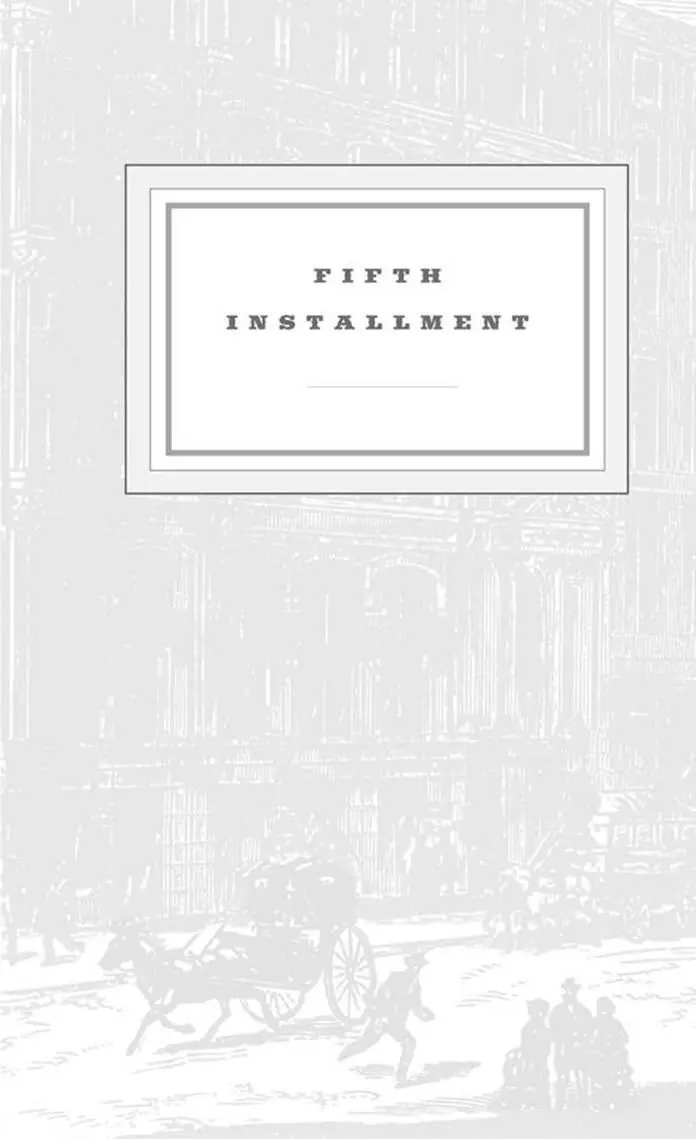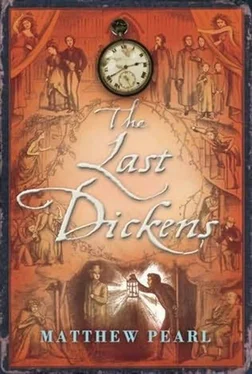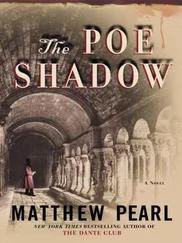“Treasury Department? Too late. New York police here and we've got him and Boz for what they owe the city of New York.” Two of the detectives took Dolby's arms. Another grabbed Tom Branagan. As a cacophonous shouting match erupted over which arrest took priority, the bell sounded from above alerting those going ashore to return to the ferry.
“We have our police boat alongside,” one of the detectives said. “But since it appears you boarded at the dock, I'd disembark with the others before you lose your passage, unless you fellows plan to see much of Liverpool.”
Pennock and his unhappy agents yielded, rushing back to deck and jumping onto the last ferry taking away the passengers’ visitors and servants. When they were gone, the detectives said to one another, “Shall we put them in shackles now or on our boat?”
“Let's round up Dickens first, so there's no escape.”
“Get your stick ready, then.”
“Imagine! What the pressmen would have done with seeing the Inimitable Dickens in irons!”
Suddenly, the four men laughed. Dolby, amazed at this change in demeanor, stared at them.
A detective removed his hat and smiled. “Very sorry, sir. Our chief of police is quite an admirer of your Mr. Dickens. When he heard something about the tax collector's plan, he sent us to scare them off. Now we should be returning to our own boat presently and let you be on your way. But perhaps old Boz can spare an autograph or two for our boss?”
Dolby and Tom looked at each other in amazement.
Before they made their way back to the police boat, the policemen were carrying with them armfuls of autographs. Cannons from nearby tugs fired to say good-bye. After endless cheering and many farewells from the ferry and from the shore, Dickens, standing on the rail, put his hat onto the top of his cane and waved it high at the crowd.
Tom stood close behind him on deck, just in case his boot slipped. From his vantage point, he could see Dickens's eyes tearing up.
“Perhaps you will come back to America again, Chief,” Tom suggested.
“Surely,” Dickens agreed. “Maybe, though, I've left just enough of myself here already.”

***

London, England, July 16, 1870
FOR FIVE DAYS AFTER OSGOOD'S ASSAULT BY THE OPIUM FIENDS, Rebecca tended to her employer at the Falstaff Inn, where he slept almost continuously. There were frequent visitations by the local Rochester doctor. Datchery had come, too, looking distraught and weepy at the sight of Osgood's condition. In his waking moments, the publisher tried to breathe but mostly coughed.
“No blood expelled when coughing,” Dr. Steele observed to Rebecca a day after the attack. “The fractures are likely on the surface of the ribs, and the lungs unhindered. I do not like to apply physic or leeches in such cases if there isn't inflammation.”
“Thank God for that,” Rebecca said.
“He must be bathed with cold water regularly. You seem to have had some experience as a nurse before, Miss.”
“Will he recover fully, Doctor?” asked Rebecca urgently.
“The chloroform and brandy should cleanse his body, I assure you that, miss. If he's one of the lucky ones.”
When Osgood's mind felt clearer, he still could hardly describe what had happened in the early morning at the opium rooms that had ended with two of the opium fiends dead and mutilated. Rebecca was sitting at a writing desk composing a letter to Fields with the latest news, and Datchery was half asleep in an armchair when Osgood woke again.
“It was Herman!” Osgood groaned as he had done when found by the sewer hunter. His ribs were wrapped in a broad bandage that went twice around his body, constraining his movements and respiration. Bites from the sewer rats had swelled around his face and neck in giant red patches.
“Are you very certain it was him, Mr. Osgood?” Rebecca asked, coming over to his bedside.
Osgood gripped his forehead with both hands. “No. I'm not certain at all, Miss Sand. We know he couldn't have survived the ocean, after all! And who would have stopped him from doing worse to me, if he was there to see me dead? It must have been a vision from the opium, like the snakes and the voices. I had fallen under its spell.”
“We shall find out what it was that happened, I promise you that!” cried Datchery. “My dear Ripley, my dear Miss Rebecca, I certainly promise you that!” He took one of Osgood's hands and reached for Rebecca's, but Rebecca stepped away distrustfully. “They say you'll be sick as a horse for a while, old fellow. Only tell me you'll live a day longer and I'll be tripping on the light fantastic!”
Though his head remained bandaged, Datchery's own injuries were more superficial than Osgood's. He had not seen anything that had happened after his own attack and had not seen any sign of Herman before he was knocked out. As they had with Osgood, someone had dragged him unconscious into the streets. Rebecca wanted nothing to do with the man who had brought Osgood to a low point and had before that caused them to argue in what was now a shameful memory.
Datchery said, “Miss Rebecca, I wish to help. I can help, you know. Let the idea ripen in your mind.”
“I think you have helped enough,” she said. “And you may refer to my employer as Mr. Osgood, if you please.”
Datchery chewed his lip in frustration, then turned to the patient in bed and then back to Rebecca. “Perhaps there are some things I must say that shall help you trust me as your employer has so quickly learned to do.”
“Ah, Mr. ‘Datchery,’ is it?” This was Dr. Steele coming into the room. “May I have a private word with you?”
Datchery, looking over the drowsy face of Osgood above the blankets, nodded and left the room. To Rebecca's great relief, the visitor did not come back that afternoon.
The next time Osgood woke, he asked for the suit of clothes he had been wearing during the attack, now hanging in the wardrobe. Searching the pockets, he removed the green pamphlet he had taken from that filthy floor.
“Edwin Drood! Look.”
There it was. The cover was a kaleidoscope of illustrated scenes from Dickens's novel. The pamphlet was in fact the fifth installment published of the serial of The Mystery of Edwin Drood. Dr. Steele, just arriving for another inspection, came over to the bed when he saw Osgood had stirred. This doctor, a lanky and studious man, had become a tyrant over Osgood's care. He commanded that light only be allowed through the window blinds at short intervals.
“I have asked that Mr. Datchery to leave Mr. Osgood in peace,” Dr. Steele explained to Rebecca. “He only seems to agitate him, I can assure you.”
“I think so too,” Rebecca said firmly.
The doctor now discouraged Osgood from studying the booklet that apparently also agitated him. Rebecca consented to remove the object from the patient, though she pondered the terrific coincidence of the item having appeared in such a place. Had Osgood's misfortunes in the low streets really been due to the region's usual dangers or somehow connected to their singular mission in England? She opened the booklet and noticed the pages looked like they had been read, perhaps multiple times. She placed the installment in a drawer.
“I do not understand,” Osgood sighed as the doctor unwrapped his dressings and applied fresh bandages. “I do not see how the opiates I breathed could have had such a strong effect on me.”
Читать дальше














